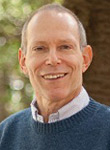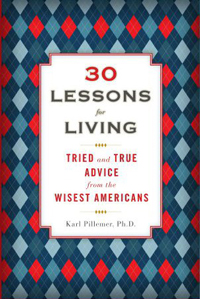New book shares life lessons from 'wisest Americans'
By Ted Boscia


For 25 years, Cornell gerontologist Karl Pillemer has researched answers to many facets of aging -- coping with Alzheimer's disease, improving nursing home care and supporting family caregivers. Now he's turned to America's elders for a very different reason: for guidance on living happier, more fulfilling lives at any age.
In "30 Lessons for Living: Tried and True Advice From the Wisest Americans" (Hudson Street Press/Penguin), Pillemer, the Hazel E. Reed Professor of Human Development in the College of Human Ecology, shares practical advice about living the good life from more than 1,200 individuals age 65 and older -- a number of them Cornellians -- who possess what he calls "transcendental wisdom" gained from surviving war, poverty, social upheaval and other hardships.
"My goal in this project was to ask older people what they know about living that younger people don't," said Pillemer, who worked on the project for six years. "People in their 70s, 80s and beyond -- my oldest interviewee was 108 -- are credible experts on such issues as finding a purpose in life, avoiding regrets and, of course, on how to age fearlessly and well. And it felt urgent to me to capture what the older generation knows, before they are gone."
Upon turning 50, Pillemer thought, "maybe there is something about getting older that teaches you how to live better." He had read research showing that older people show higher levels of happiness than younger people, but no studies of precisely what elders would advise the rest of us about how to live.
With the help of Cornell student research assistants, Pillemer set out to explore the issue through a series of studies. At first, he wrote to older adults seeking replies to the question: "What are the most important lessons you have learned over the course of your life?" After a flood of responses, Pillemer knew he had struck gold. With the help of the Cornell Survey Research Institute, he followed up with a national random sample survey of more than 300 older adults on the subject before selecting approximately 240 additional individuals for in-depth interviews.
The advice [America's elders] give is just so highly relevant to most of us. For example, who better to tell us how to live well through hard times than someone who survived the Great Depression?" Pillemer said.
Pillemer distills the responses into six major themes in the book: marriage, careers, raising children, aging, avoiding regret, and securing happiness/enduring hardship and presents five time-tested lessons on each. The book mixes personal reflections and direct quotes from seniors with commentary and insights from Pillemer.
Older Americans are an "irreplaceable natural resource," Pillemer writes, and his efforts are ensuring that their wisdom lives on. In addition to "30 Lessons for Living," he oversees The Legacy Project, a website to share tips for living, and a companion YouTube channel.
Ted Boscia is assistant director for communications in the College of Human Ecology.
Media Contact
Get Cornell news delivered right to your inbox.
Subscribe